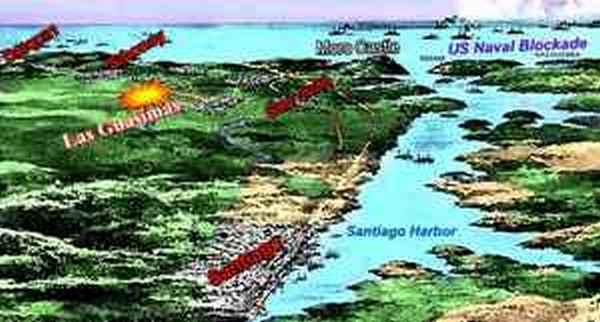Theodore Roosevelt
and the Spanish American War
The 26th President of the United States had paid his dues with years of public service before reaching the pinnacle of the government pyramid. Roosevelt had begun as an assemblyman in the New York State legislature, civil service commissioner, police commissioner, and finally on the national scene, Assistant Secretary of the Navy.
His appointment by President McKinley in 1897 was to a department where the Cabinet Secretary John D. Long was an absentee landlord. Assistant Secretary Theodore Roosevelt became the de facto head of the Department of the Navy. With little naval experience, Roosevelt embarked on a campaign to ready the navy for war.
Theodore Roosevelt and the Spanish American War Theodore Roosevelt and the Spanish American War
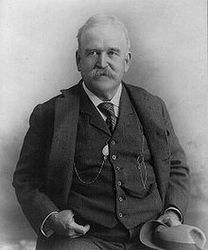 |
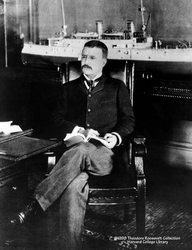 |
Roosevelt's imprint on policy was immediate. He sensed that war with
Spain was inevitable. The litany of Spanish misrule in Cuba was endless.There was the harsh treatment of Cuban women and
children placed in concentration type camps and repression of those calling
for freedom. Then there was proximity--90 miles from Florida and vocal Cuban emigres in America's sunshine state.The press was ready to exploit the situation and called the Spanish
"butchers" in an effort to stir greater readership. Not least in importance was
one hundred million dollars in American investment in the island. The new Assistant Secretary of the Navy ordered more
ammunition, more supplies, more refitting and modernizing the existing
fleet, and more sailors and additional war drills.
It is evident that Spain was on Teddy Roosevelt's near horizon. In addition to possessions so close to the United States, it was a European country with extensive colonial territories in Asian waters where America was already asserting itself in a near collision with Germany over control of Samoa (1889). The Secretary was particularly judicious in selecting a new commander for the U.S. Pacific Squadron. He chose George Dewey, a man who would not shy from action, and a highly competent strategist. In short, he must have seen Dewey as a kindred combative spirit.
Roosevelt gave notice to his boss that in the event of war he would resign and actively join the war effort. He had been commissioned as a first Lieutenant in the New York National Guard in 1882 and ultimately resigned as a captain in 1886.
Secretary Long referring to Roosevelt:
"He bores me with his plans of naval and military movements, and the necessity of having some scheme of attack arranged for instant execution in the case of emergency".
Despite this criticism, he also privately expressed that he was satisfied with the performance of his Assistant Secretary. They merely had differences about the Roosevelt expansionist views. Those views were starting to get favorable publicity in the press. A fact that pleased Roosevelt. After all, he was a politician that always looked for the next step up on the ladder.
Senator Mark Hannah on Roosevelt: " --if Roosevelt had been put in the State Department, we'd be fighting half the world".
Roosevelt was suspicious of German intentions in the western hemisphere. He believed that they coveted colonies in Central and South America. As a fervent supporter of the Monroe Doctrine, he objected to their military presence in an American sphere of influence. He also saw Spain's presence in Cuba as a violation of the spirit of the Doctrine. His belief was obviously shared with Captain Sigsbee of the Maine and Admiral Dewey when they both took particular notice of the German naval presence in Havana Harbor and Manila Bay.
Japan did not escape the Roosevelt view. When it was obvious that the United States would annex Hawaii (January 1899), Japan complained that it was a threat to the large Japanese population that emigrated there. In typical Roosevelt bluntness he responded:
"The United States is not in the position which requires her to ask Japan, or any other foreign power, what territory it shall or shall not acquire".
Three weeks into his office (May 3, 1897), as Assistant Secretary, he wrote that there was a need to build a dozen battleships and half of those for duty in the Pacific theater. He continued:
"---I am fully alive to the danger from Japan---".
Closer
to home waters, the under secretary sought to beef up the naval
squadron at Key West, Florida. This was no longer an academic exercise when news
of the explosion on USS Maine in Havana Harbor made the front pages on
February 15, 1898. Up to this point, Secretary Roosevelt was operating
behind the back drop of a McKinley administration that was adverse to
any expansion that would plunge America into war. In fact, there is some
evidence that he hewed to the initial McKinley line that the explosion
was an accident. Privately, he made no effort to avoid blaming Spain
for sinking the Maine with an underwater mine.
Theodore Roosevelt and the Spanish American War
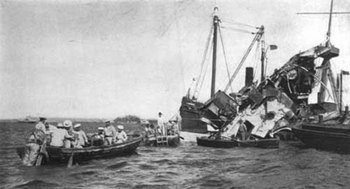
On the following day, Roosevelt wrote his boss, Secretary Long:
"The coincidence of [the Maine’s] destruction with her being anchored off Havana
by an accident such as has never before happened, is unpleasant enough to
seriously increase the many existing difficulties between ourselves and Spain. It is
of course not my province to in any way touch on the foreign policy of this
country; but the Navy Department represents the arm of the government which
will have to carry out any policy upon which the administration may finally
determine".
Roosevelt knew war was the only alternative. He cabled Admiral Dewey in the Pacific,
"Keep full of coal" and keep an eye on the Spanish Squadron.
On April 25, 1898, Spain declared war on the United States. Teddy Roosevelt had his war. He tendered his resignation as Assistant Secretary of the navy against the strenuous objection of many in the administration. He responded:
"For the last year I have preached war with Spain. I should be ashamed------if I now failed to practice what I have preached".
On April 27, Admiral Dewey was ordered to launch an attack on Spain's war ships in Manila Bay.
Roosevelt responded to McKinley's call for volunteers. He set about recruiting for a volunteer cavalry regiment. He accepted a Lt. Colonel commission to serve under Colonel Leonard Wood. When asked why he was not in full command, Roosevelt said he did not have the experience to lead a regiment, but, with his usual self confidence, (some might say hubris) it would only take him a month to be ready to assume full command (if required).
(Note below the introduction of khaki colored uniforms in the United States army.)
Theodore Roosevelt and the Spanish American War
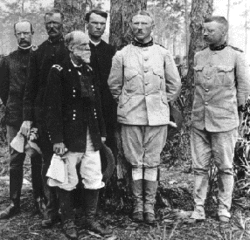
Colonels Wood and Roosevelt to the right of their Division commander, General Joseph Wheeler.
Roosevelt's recruiting concentrated on the southwest where men were more in tune with the climate of Cuba. The men were drawn from all walks of life; college men, cowboys, hunters. Applicants exceeded the demand. They were all gathered for a hard training regime in Texas and deemed battle ready.
The new regiment was shipped to the port of Tampa, Florida to be part of the invasion force destined for the south east coast of Cuba. They were immediately exposed to the chaotic conditions of the transports that were too small for the first wave to leave Florida.
The 1st U.S. Volunteer Cavalry Regiment had been dubbed by the newspapers, "The Rough Riders". They learned that their horses could not be shipped and that they would serve as dismounted cavalry. Colonel Roosevelt managed to include his mount in the shipment. Space was at a premium, and with great disappointment the regiment had to leave behind four full troops (companies) depleting regimental man power..
Roosevelt in Cuba
The Rough Riders regiment landed in Daiquiri on June 22, 1898. The standing order was to remain on the beach and commit no offensive movement until all troops had landed. The commander of the Cavalry division ignored the order. General Joseph Wheeler was intent on spearheading the coming battle instead of the usual strategy that dictated that the cavalry would follow the infantry.
Wheeler
marched his men (no mounts) northward. The Roosevelt regiment had its
first contact with a tropical jungle. A reporter described it as "a maze".
They were about 10 miles north of the landing area at Siboney following
a jungle track. The heat was intense.They dropped equipment as they
moved forward. Roosevelt later said that he only traveled with a tooth
brush and a rain slicker. The oppressive heat was taking its toll on the
men. some were suffering from heat stroke. They arrived at Las Guasimas with less than 500 men to find the army regulars in battle with a
Spanish rear guard charged with delaying the Americans movement toward
Santiago de Cuba. In the next hour and half they helped to dislodge the
Spaniards and opened the road to their target city--Santiago. The
cavalry unit and Roosevelt had fought on foot although they had not
trained as infantry. They had lost 8 and 31 wounded. More men were to
die over the next week from fever. Roosevelt had personally led the G
Company attack on a fortified building dislodging the Spaniards.
Illness
was also decimating the officer ranks. Colonel Wood was promoted to
fill the Brigadier General role and took over a brigade. Roosevelt was
given the command of his regiment and made a full colonel.
Looking at Las Guasimas from the coastal south to north with landing sites at Daiquiri and Siboney.
click to enlarge
Theodore Roosevelt and the Spanish American War
On July 1 the Roosevelt regiment was given orders to move northward toward Santiago. They were instructed to encamp at the foot of the San Juan Heights and took a position at the base of Kettle Hill which was separated by a small gully and a pond from the more elevated San Juan Hill. It was evident to Roosevelt that his men were being held in reserve.
The First Infantry Division began the assault on San Juan Hill. Roosevelt had received no new orders and was becoming impatient. He finally received the command to assault Kettle Hill. He noted that the 1st and 9th cavalry and received no orders to advance. He requested that they join his forces and they complied.
Roosevelt later explained why he began the ascent mounted. He said that his men would not be able to see or hear him as he issued commands and he would of necessity constantly rotate his position. When they encountered barbed wire it forced him to dismount. The Spaniards in trenches at the crest were pouring fire on the advance below. Then the rapid fire of Gatling guns started raking the Spanish trenches. Those machine guns beat off a Spanish counter attack. The Americans had an opening to exploit and rushed upward. The defenders feared hand to hand combat with the Americans and withdrew to the Santiago perimeter.
Roosevelt was effusive in the praise of Lt. Parker's Gatling detachment:
"I think Parker deserved rather more credit than any other one man in the entire campaign...he had the rare good judgment and foresight to see the possibilities of the machine-guns..He then, by his own exertions, got it to the front and proved that it could do invaluable work on the field of battle, as much in attack as in defence (sic)".
Roosevelt's men were equally as proud of their new commander who had exhibited rare courage and calming influence under enemy fire. They would never forget him waving his hat as he rode before them up the hill. They would never forget his compassion for his men that led him to personally forage for food. He found 100 pounds of beans that he distributed in his camp.
The Rough rider encampment at the foot of Kettle Hill.
Theodore Roosevelt and the Spanish American War
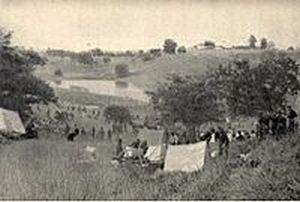
Theodore Roosevelt and the Spanish American War
Roosevelt then rallied his men to cross the valley between Kettle and San Juan Hills. By the time he reached San Juan Hill the battle had been won. Roosevelt was ordered to return to Kettle Hill where he repulsed a counter attack with the aid of one Gatling gun.
Teddy Roosevelt referred to July 1, 1898, as the"great day of my life". He also marveled that he had survived unscathed. Of the 400 Rough riders in action, there were 86 casualties. Richard Davis, whose reporting of the battle, fascinated American readers. He recounted the courage of Roosevelt in the forefront of the charge assaulting a Spanish trench in the face of their Mauser bullets.
Theodore Roosevelt and the Spanish American War Theodore Roosevelt and the Spanish American War
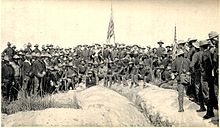 Victors of Kettle Hill Rough Riders on crest of San Juan Hill. |
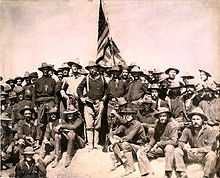 |
Subsequent to the surrender of Santiago, Roosevelt and his men were repatriated to Montauk, Long Island where they received treatment for the enervating fevers contracted in the jungles.
In September, 1898, the Roosevelt regiment was disbanded and Roosevelt was presented a gift from his men: the famed Frederic Remington "Bronco Buster".
Back in the United States, Roosevelt was besieiged by political leaders to run for office. His reputation and name identity were known in every household. Tom Platt was the powerful three term senator from New York, and the political boss of the state's Republican party. He was not particularly partial to Roosevelt, but previewed history when he said if he becomes governor (of New York), "he will have to be President of the United States". The bullet that assassinated President McKinley on September 14, 190l, accelerated the process when Vice President Theodore Roosevelt was elevated to the highest elected office in the land as the 26th President of the United States.
Theodore Roosevelt and the Spanish American War
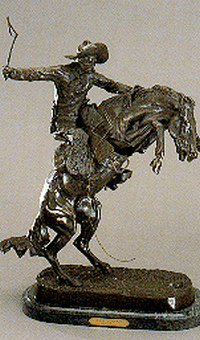
President Theodore Roosevelt died January 6, 1919. He was awarded the Medal of Honor posthumously 82 years after his valorous conduct in combat in Cuba (2001) .
Theodore Roosevelt and the Spanish American War Theodore Roosevelt and the Spanish American War
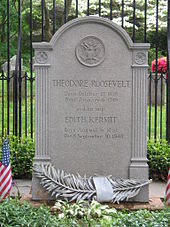 |
 |
Theodore Roosevelt and the Spanish American War
_______________________________________________________________________
Theodore Roosevelt and the Spanish American War References:
Lemelin, David. James Madison University
Miller, Nathan. Theodore Roosevelt - A Life, William Morrow and Company,Inc.New york 1992
Spanish American Centenial Web site. Rough Riders Letters
Wikipedia
See Spanish American War History
American Wars | Spanish American War Timeline | Theodore Roosevelt and the Spanish American War
Top of Theodore Roosevelt and the Spanish American War
